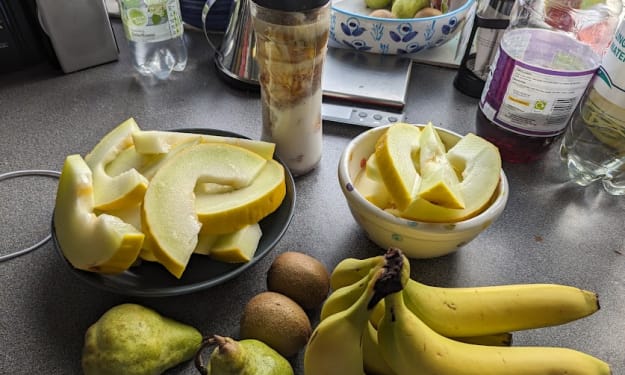A Few Things I Have Learned Since Marrying a Canadian Vegetable Farmer
... And Why the Need for Food Education Needs to Be Addressed Sooner Rather than Later

Number one: Unlike how we've been conditioned to think, high quality vegetables are NOT available 12 months of the year.
If they are, these fruits and veggies are not local and it takes a lot of scary techniques to keep them looking like that. Have you ever driven from Mexico to Canada in one go? How do you think you would look after that long journey when you arrived at your door? I would say, probably pretty haggard and tired looking. It's just not normal for anyone (vegetable or human) to travel that far, and arrive looking so pristine. Marrying a vegetable farmer taught me about the flow of my local planting seasons. Newsflash: The potatoes that you eat in the winter are from the summer. And if you buy the grocery store russets (the leathery ones that everyone wants for the BBQ and for “jacket potatoes”), more often than not they’re from the previous summer before i.e. they are OLD.
Number two: There are so many factors that go into growing a “perfect,” store quality vegetable.
Have you ever tried growing your own vegetables? Say you have a small, backyard, “no spray/relatively organic,” garden that you tend to all through the year. I would like to go to your home, harvest all those vegetables, line them up and see what they look like. I really would like to take a peek! Are they different sizes? Are your potatoes perfectly round? Does your cucumber look like the classic avatar of a cucumber, or does it kind of look like a shriveled old dick? Because that’s just how they turn out sometimes, and for so many reasons (weird pollination, wet season or a dry season, etc.). With a small tiny garden in your backyard are you able to monitor every single vegetable and pest? Now take that amount of vegetables and pests and multiply it times 1000. Then a million. Not so easy to keep an eye on things, eh?
Number three: The reason why your potatoes are sprouting, is because they are living plants.
Those scary looking, purple, spider-leg like appendages are a GOOD SIGN! They sprout when they’re warm, because they think it’s the spring and that it’s time to grow! If you had a vegetable farm, you would take those potatoes, plant them in the ground and you would have beautiful, abundant potato plants. There is nothing wrong with your potatoes because they sprout, and if anything, it means that they are healthy and that they didn’t get sprayed in a, “Fukushima way.” If you have potatoes that have been hanging out in a bag, in your homes, in a room that is heated to any degree, and they DON’T sprout? THAT IS A BAD SIGN. It means that they have been sprayed so much that they are hardly an edible thing. So not only are you ingesting that poison, but you are eating a dead plant. Yummy.
Number four: For the love of Christ, do not eat green potatoes!
I am amazed at how many people I talk to that say that they bought a big bag of potatoes from the grocery store, and, “they were all green, and tasted funny!” That is terrifying. You should NEVER eat green potatoes. You are ingesting poison. It means that the potato you are about to eat, was sitting out in direct sunlight for an unknown amount of time. It doesn’t take much time at all for sun exposure to push any spray into that potato, making it inedible. There is a reason why people sell potatoes with dirt on them, because it protects them from getting sunburnt.
Finally: Farming is really hard work.
And it seems to be fast becoming an absolutely thankless job to a generation of eaters who have no sweet clue where their food is coming from. Last summer, I was working the vegetable stand at my husband’s family farm, and had a woman came in. She put a bag of our potatoes (beautiful new baby reds) on the counter, looked me right in the eye and said, “there is no way in HELL that I am paying this much for these potatoes.” She went on to explain to me that she could get them at the grocery store for half the price.
You know in films when a character has a flashback? A series of images that run through their head very quickly? Immediately I flashed back to just after Christmas: I saw myself in the farm kitchen, the snow was coming down as I watched my husband and his father decide on the seed for the potatoes. Skip ahead to a few months later, my mother-in-law is on the phone calling people to hire to help plant the potatoes, the days upon days of walking up and down the massive fields cutting sets, and planting the potatoes BY HAND, the day the tractor broke down and we had to have a neighbor come help us out. The constant tending, the constant picking, not to mention the weighing, and the bagging. Weeks and months of work, and how we diligently checked each potato by hand to make sure that they were fit to bag.
I came back into my body, and kindly told the woman that I wouldn't drop the price. She left in a huff, saying how she, "might as well go to the co-op," where they care about their customers. She got into her truck, pulled out of the driveway and I returned that beautiful five pound bag of baby reds to the shelf, under the chalkboard sign that read, "New Potatoes: Only $4.95!"
I could go on, but I'm exhausted. The long and short of it is, that we need to wake up to where our food is coming from, and to have some deep respect and empathy for the amazing men and women who spend their lives growing the food we all are privileged to eat. Did you know that farmer's have one of the highest suicide rates? Take a minute to think about maybe why that could be.






Comments
There are no comments for this story
Be the first to respond and start the conversation.